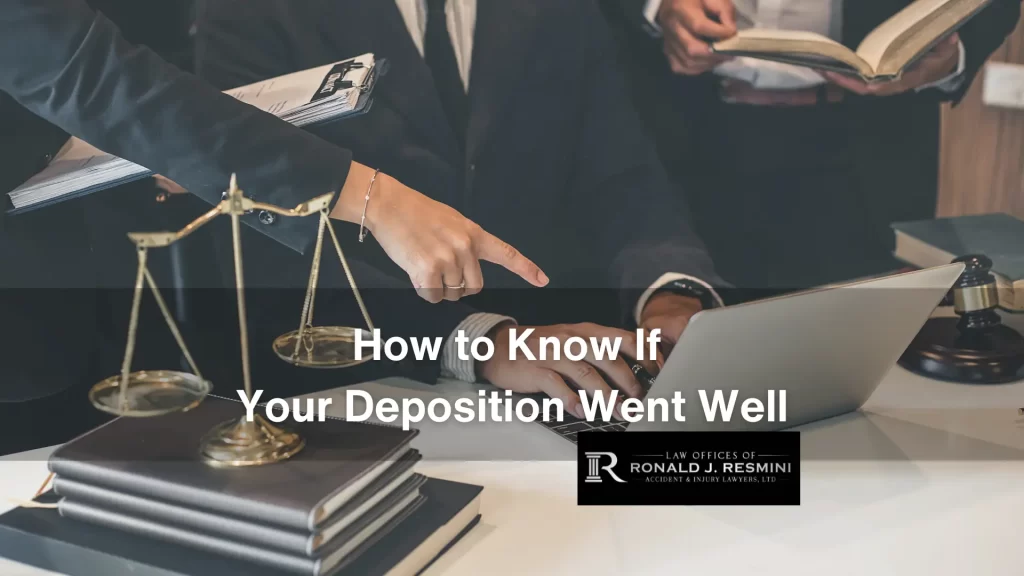 The objective of a deposition is to aid the “discovery” of evidence and information in a lawsuit. Attorneys from both sides review deposition testimony for credibility and consistency. Depositions can be seen as a practice run in preparation for court, and they can lay the foundation for recovering compensation in a later settlement or verdict. A deposition can establish the strength of your legal position going into trial.
The objective of a deposition is to aid the “discovery” of evidence and information in a lawsuit. Attorneys from both sides review deposition testimony for credibility and consistency. Depositions can be seen as a practice run in preparation for court, and they can lay the foundation for recovering compensation in a later settlement or verdict. A deposition can establish the strength of your legal position going into trial.
A successful deposition is one in which well-prepared witnesses answer a range of questions calmly, concisely, and consistently. You’ll know your hearing went well if these factors are true:
You Eliminated Pre-Deposition Stressors
Although depositions do not take place in court, they are held under oath with a court reporter taking notes. They can feel far from informal. However, you can do some non-legal preparation to calm your nerves before answering questions:
- Prepare the outfit you will wear
- Get plenty of rest the night before
- Arrive at the meeting place on time
- Bring your own medicine and snacks
Eliminate external stressors that could detract from your performance in a deposition. There is nothing worse than arriving tired, feeling unfocused, or fidgeting under questioning. Be prepared to turn off your cell phone before entering and think about your answer before speaking.
You Are Confident in Your Legal Counsel
During a deposition, your attorney cannot wink, smile encouragingly, or tell you when you have done well. However, they will prepare you to answer questions naturally and with conviction. Of course, you have sworn to answer truthfully and, as your lawyers will advise, make sure to:
- Listen carefully to each question
- Pause and think before answering
- Ask for clarification where needed
You know your deposition is going well if you are answering questions to the best of your ability according to the advice of counsel. Your lawyers are there to protect your interests and object to questions you should not answer. Allow them the space to do that by following their cues.
Opposing Counsel Did Not Throw You Off
Opposing counsel may seem to ask the same question in different ways. They may ask personal questions that make you uncomfortable. However, you can answer honestly without giving too much away by remembering that you do not owe opposing counsel the following:
- Explanation or justification
- Elaboration after “yes” or “no”
- Guesses at what you don’t recall
- Approximations of the “right” answer
You are not penalized for truthfully answering, “I don’t know” or “I don’t remember.” However, you will set your case back by guessing or feeling pressured to estimate. Do not take remarks by opposing counsel personally. Depositions are stressful for everybody, including attorneys.
You Answered Questions Directly
We tend to hedge when unsure or “lay the foundation” for an answer. This is not necessary in a deposition. Your attorneys will prepare you to give direct answers without a backstory and phrase responses in a way that will strengthen your case.
Better to answer truthfully and appear plausible than make up a half-truth that you think will help your cause. The goal in a deposition is to appear credible, not be a hero. You prevail by giving precise answers and being honest when you don’t know or can’t remember.
Your Deposition Strengthens Your Claim
 In personal injury cases, your deposition goes well when your side proves the other party was negligent, causing accidental injury. This may take one or several depositions in which your attorneys establish that:
In personal injury cases, your deposition goes well when your side proves the other party was negligent, causing accidental injury. This may take one or several depositions in which your attorneys establish that:
- The breach of a legal duty of care
- Directly caused an accidental injury
- That impacted a person’s life or work
- For which the injured party deserves compensation
This may require the deposition of other witnesses, experts, and people from the other side, but you only need to focus on your answers to make your deposition go well. You will know it went well when you debrief with your lawyer.
Consult an Experienced Attorney for a Successful Deposition
You enhance your chances of success in a deposition by being prepared to answer legal questions effectively. Having the right lawyer on your team to help you prepare is the best way to have a successful deposition. An aggressive personal injury attorney can pursue the compensation you need to cover your accident-related injuries and losses after someone else’s wrongdoing injured you.
The experienced Providence personal injury lawyers of the Law Offices of Ronald J. Resmini, Accident & Injury Lawyers, Ltd. can help. Call (401) 444-4444 today for a free and confidential case evaluation. When you hire our firm, we’ll stand by you every step of the way and fight to protect your rights.
View our Past Case Results
Read more:
